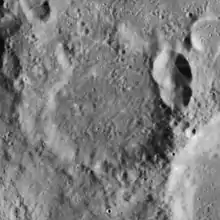Krusenstern (crater)
Krusenstern is a lunar impact crater that lies amidst the battered terrain in the southern part of the Moon's near side. Nearly attached to the east-southeast rim is the crater Apianus. Less than one crater diameter to the southwest is the prominent Werner. Krusenstern is intruding into a large circular plain to the north designated Playfair G. Playfair itself lies to the northeast.
 Lunar Orbiter 4 image | |
| Coordinates | 26.2°S 5.9°E |
|---|---|
| Diameter | 47 km |
| Depth | 1.6 km |
| Colongitude | 355° at sunrise |
| Eponym | Adam Johann von Krusenstern |
Krusenstern is 47 kilometers in diameter, and its walls reach a height of 1,600 meters.[1][2] Its outer rim has been heavily worn by impact erosion, leaving an irregular ring of rising ridges and an inner wall incised by impacts. A joined pair of craters, including Krusenstern A, lie along the eastern rim. The interior floor of Krusenstern is a nearly featureless plain, marked only by a few tiny craterlets.[3] The crater is from the Pre-Nectarian period, 4.55 to 3.92 billion years ago.[1]
It is named after Adam Johann von Krusenstern, an early 19th-century Baltic German explorer in Russian service.[4][1]
Satellite craters
By convention these features are identified on lunar maps by placing the letter on the side of the crater midpoint that is closest to Krusenstern.[5]
| Krusenstern | Latitude | Longitude | Diameter |
|---|---|---|---|
| A | 26.9° S | 5.9° E | 5 km |
References
- Autostar Suite Astronomer Edition. CD-ROM. Meade, April 2006.
- "IDENTIKIT". luna.e-cremona.it. Retrieved October 25, 2007.
- Rükl, Antonín (1990). Atlas of the Moon. Kalmbach Books. ISBN 0-913135-17-8.
- "Krusenstern (crater)". Gazetteer of Planetary Nomenclature. USGS Astrogeology Research Program.
- Bussey, B.; Spudis, P. (2004). The Clementine Atlas of the Moon. New York: Cambridge University Press. ISBN 0-521-81528-2.